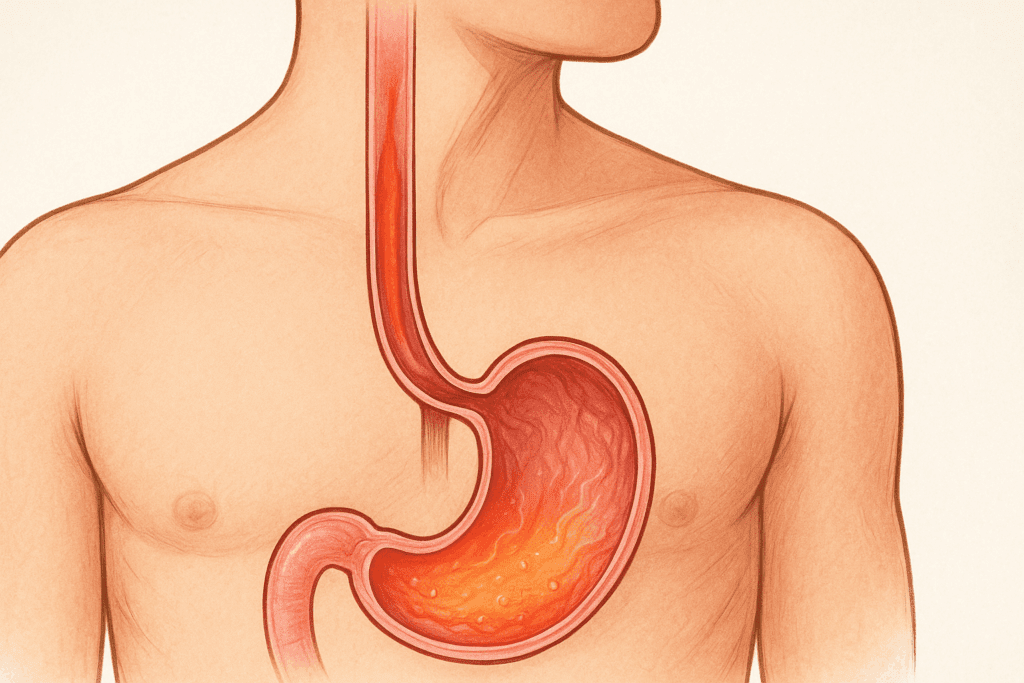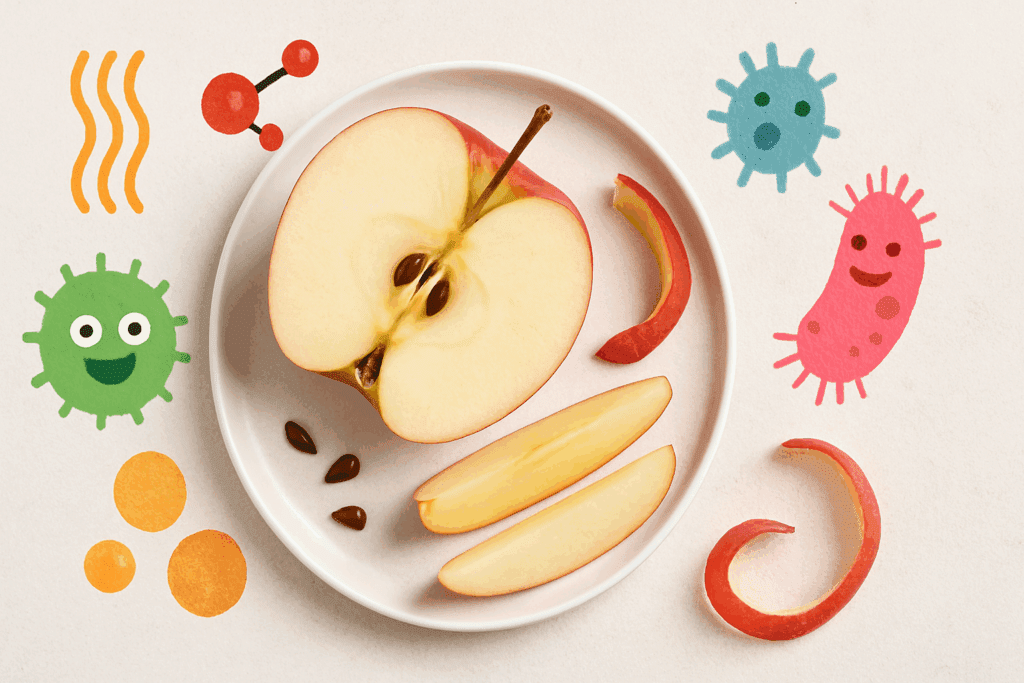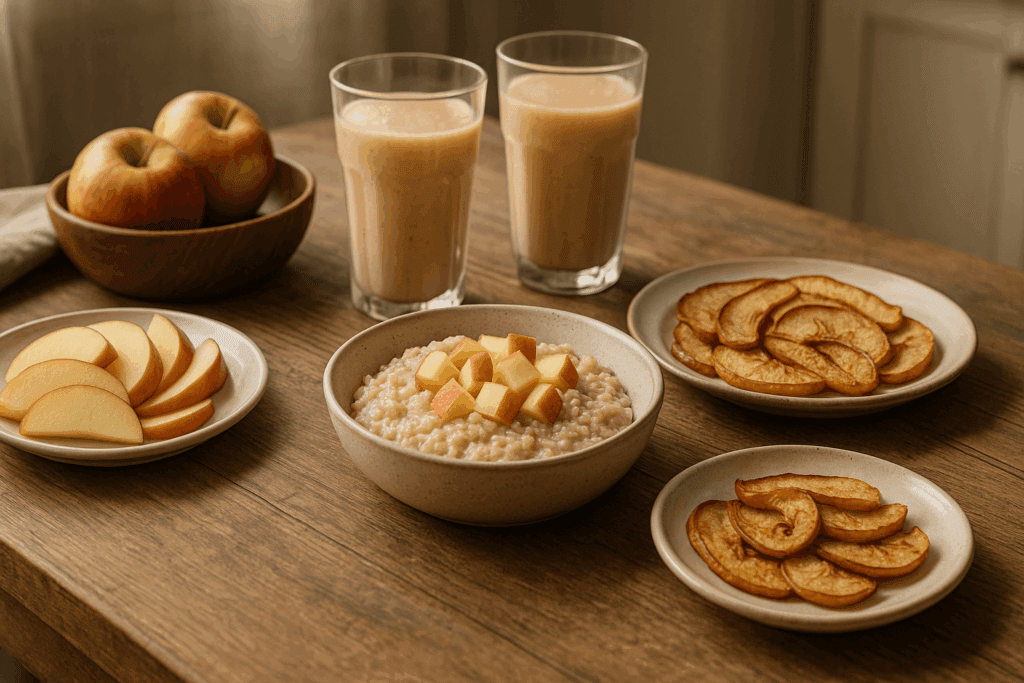Introduction: Exploring Natural Solutions for Acid Reflux and GERD
Managing acid reflux and gastroesophageal reflux disease (GERD) has long challenged those seeking relief without relying solely on pharmaceuticals. Many turn to dietary changes as a powerful tool in symptom management, often asking questions like “are apples good for acid reflux?” As holistic wellness gains greater attention, apples have emerged as a natural option that may offer digestive support. This article will explore the science behind apples and GERD, reveal how apples acid reflux benefits are being increasingly recognized, and explain how these humble fruits fit into a broader holistic approach to gut health and probiotics.
You may also like: The Ultimate Guide to Gut Healthy Meals: Best Meals for Gut Health and Nourishing Recipes You’ll Love
Understanding Acid Reflux and GERD: A Foundation for Gut Health
Acid reflux occurs when stomach contents, including acid, flow backward into the esophagus, causing symptoms such as heartburn, regurgitation, and chest discomfort. GERD represents a more severe, chronic form of acid reflux, often requiring medical attention if left unmanaged. The esophageal lining is sensitive and not designed to withstand repeated exposure to stomach acids, which explains why persistent reflux can lead to inflammation and even structural damage over time. Factors such as diet, weight, lifestyle habits, and genetic predisposition all contribute to the development of acid reflux and GERD.
Traditional treatments typically include proton pump inhibitors (PPIs), H2 blockers, and antacids, but these options are not without side effects, particularly with long-term use. Consequently, attention has shifted toward natural strategies for managing acid reflux, with foods playing a pivotal role. Among these, apples have captured interest for their potential in soothing symptoms naturally and supporting digestive health holistically.

The Nutritional Powerhouse of Apples: Why They Matter for Digestive Wellness
Apples are one of the most widely consumed fruits globally, renowned for their accessibility, affordability, and diverse health benefits. Rich in dietary fiber, particularly pectin, apples contribute to improved gut motility and a balanced microbiome. Pectin acts as a prebiotic, nourishing beneficial gut bacteria that, in turn, support a healthier digestive tract.
Beyond fiber, apples offer an array of polyphenols—bioactive compounds with antioxidant properties that combat oxidative stress and inflammation. Chronic inflammation is a significant driver of GERD and other digestive disorders, making apples an intriguing dietary ally. Additionally, apples provide vitamins C and K, potassium, and small amounts of magnesium, all of which play roles in maintaining cellular health and gastrointestinal function.
Given these attributes, it is not surprising that conversations surrounding apples and GERD have intensified, with many seeking to understand how this everyday fruit might offer unexpected support for acid reflux sufferers.
Are Apples Good for Acid Reflux? Uncovering the Evidence
Research into the question “are apples good for acid reflux” suggests promising, albeit complex, answers. Apples, particularly sweeter varieties like Red Delicious or Fuji, tend to be lower in acidity compared to more tart apples, reducing their likelihood of triggering reflux symptoms. In fact, some individuals report that consuming a sweet apple before bedtime helps reduce nocturnal heartburn episodes, a common complaint among GERD sufferers.
One proposed mechanism is the ability of apples to neutralize stomach acid due to their alkaline nature once metabolized. This property can provide a soothing effect on the esophageal lining. Additionally, the pectin content in apples forms a gel-like substance when digested, which may help create a physical barrier against acid reflux.
However, responses to apples can vary among individuals. For some, particularly those sensitive to fermentable carbohydrates like FODMAPs, excessive apple consumption may exacerbate symptoms due to fermentation in the gut. Thus, while apples acid reflux relationships appear generally positive, personal tolerance and moderation remain critical considerations.

Apples and GERD: How This Common Fruit Can Support Long-Term Digestive Health
Understanding the link between apples and GERD requires a closer look at how diet impacts esophageal integrity and acid exposure. A diet rich in fiber, antioxidants, and anti-inflammatory compounds, such as that found in apples, supports overall gut health and can reduce factors that exacerbate GERD.
Fiber, for instance, enhances satiety, helping with weight management—a significant risk factor for GERD. Excess abdominal fat increases intra-abdominal pressure, pushing stomach contents upward into the esophagus. By promoting a healthier weight, apples indirectly help mitigate this mechanical trigger of reflux.
Polyphenols found in apples also exhibit anti-inflammatory properties that may reduce esophageal irritation. Moreover, the antioxidants in apples combat oxidative damage, which has been implicated in the progression of Barrett’s esophagus, a precancerous condition linked to chronic GERD.
Thus, integrating apples into a GERD-friendly diet aligns with a broader, preventive health strategy that emphasizes whole, minimally processed foods known to support the gut barrier and reduce inflammation.
Selecting the Right Apples for Acid Reflux Relief
Not all apples are created equal when it comes to managing acid reflux. Varieties lower in acid and higher in natural sugars tend to be better tolerated by those with GERD. Red Delicious, Gala, Fuji, and Ambrosia apples are among the sweeter varieties that have garnered positive anecdotal feedback from acid reflux sufferers.
In contrast, tart apples such as Granny Smiths have higher acid content and may provoke symptoms in sensitive individuals. Nonetheless, personal tolerance plays a decisive role, and experimentation—preferably under the guidance of a healthcare provider—can help identify which varieties best suit individual digestive health needs.
It is also essential to consider preparation methods. Fresh, raw apples retain the highest levels of fiber and polyphenols, but some individuals find cooked apples, such as baked or stewed versions, easier to digest. Importantly, adding sugar or spices like cinnamon should be done cautiously, as some additives can worsen reflux symptoms.

Practical Ways to Incorporate Apples into a GERD-Friendly Diet
Introducing apples into a GERD-friendly diet can be a delicious and versatile endeavor. Sliced apples make a convenient snack, particularly when paired with low-fat yogurt or a small serving of almond butter, both of which provide additional protein and healthy fats that stabilize blood sugar levels and further support digestion.
Baked apples, prepared without added sugars, offer a warm and soothing dessert option. Combining apples with other GERD-friendly foods, such as oatmeal, bananas, or chia seeds, creates balanced meals that minimize reflux risk. Smoothies blending apples with alkaline fruits like melons and papayas can provide refreshing, nutrient-dense options for breakfast or midday snacks.
Moreover, integrating apples into salads with arugula, fennel, and a light vinaigrette dressing can add both texture and a burst of flavor without overwhelming the stomach. The key lies in mindful preparation and portion control, as even beneficial foods can cause discomfort if consumed excessively.
Can Apples Acid Reflux Benefits Extend to Gut Microbiome Health?
The relationship between apples acid reflux relief and gut microbiome health is an emerging area of scientific inquiry. The gut microbiome—a vast community of trillions of microorganisms residing in the intestines—plays an integral role in digestion, immune function, and even mood regulation.
Pectin, the soluble fiber abundant in apples, serves as a prebiotic substrate that nourishes beneficial bacteria like Bifidobacteria and Lactobacilli. A thriving microbiome contributes to a more robust gut barrier, reducing the risk of intestinal permeability, systemic inflammation, and immune dysregulation—all factors that can exacerbate GERD and other digestive disorders.
Furthermore, microbiota-mediated fermentation of pectin produces short-chain fatty acids (SCFAs) like butyrate, which have anti-inflammatory effects and support the health of colonic epithelial cells. Therefore, regular apple consumption may indirectly enhance digestive resilience, helping to prevent the vicious cycle of inflammation and reflux that plagues many GERD sufferers.

Are Apples Good for Acid Reflux When Paired with Other Holistic Strategies?
Incorporating apples into a comprehensive, holistic strategy for managing acid reflux offers greater potential for sustained symptom control. Alongside dietary modifications, lifestyle interventions such as elevating the head of the bed, avoiding meals close to bedtime, and maintaining a healthy body weight significantly impact reflux severity.
Stress management techniques, including mindfulness meditation, yoga, and deep breathing exercises, can also improve gut motility and reduce esophageal sphincter relaxation episodes often associated with emotional stress. When paired with these practices, the benefits of apples acid reflux relief become part of a broader wellness framework that addresses root causes rather than merely treating symptoms.
Moreover, pairing apple consumption with probiotic-rich foods such as kefir, miso, and sauerkraut further enhances gut microbiome diversity, amplifying digestive and immune system benefits. In this way, apples occupy a central role within a synergistic approach to digestive health.

Are Apples Good for Acid Reflux Across Different Life Stages?
Different life stages present unique challenges to digestive health, making it crucial to adapt strategies accordingly. For young adults managing stress-related reflux, apples offer a convenient, portable snack that supports both satiety and gut health without relying on highly processed options. Middle-aged adults, who often experience reflux due to weight gain and hormonal changes, benefit from the fiber content of apples to aid in weight management and inflammation reduction.
For seniors, who may face slower gastric motility and increased medication use, apples provide gentle, nutrient-dense nourishment that promotes regularity and protects against oxidative stress. Ensuring proper dental health is important, as apple skins can be tough on sensitive teeth; stewed apples may offer an accessible alternative without sacrificing health benefits.
Ultimately, the versatility and nutritional richness of apples make them a valuable asset across the lifespan for those seeking to manage acid reflux holistically.
Frequently Asked Questions About Apples, Acid Reflux, and GERD
Can eating apples before bed reduce nighttime acid reflux?
While there is anecdotal support for using apples to ease nighttime reflux, the timing and variety of apple you choose play a significant role. Sweet, low-acid apples such as Fuji or Gala are less likely to aggravate reflux, especially if consumed in moderate amounts about an hour before lying down. Apples contain pectin and fiber, which may slow gastric emptying and create a sense of fullness, potentially discouraging overeating that can contribute to reflux at night. That said, individuals with delayed gastric emptying or irritable bowel syndrome may experience bloating from apples, which could exacerbate symptoms. Experimenting with small portions and tracking your symptoms can help determine if this habit benefits your digestive comfort.
Are apples good for acid reflux when included in a low-FODMAP diet?
This is a nuanced question, as apples are technically high in FODMAPs due to their fructose and sorbitol content. For individuals with GERD who also have a FODMAP sensitivity or IBS, apples may initially worsen bloating and discomfort. However, peeled or cooked apples may reduce FODMAP load slightly and make them easier to digest. Additionally, including apples in a diet that is otherwise low in fermentable carbohydrates might still allow for occasional consumption, especially if spaced well from other high-FODMAP foods. Consultation with a dietitian can help personalize apple intake in the context of a GERD-friendly and gut-sensitive plan.
Do certain apple compounds actively soothe esophageal irritation?
Some research suggests that flavonoids and polyphenols in apples may offer anti-inflammatory and antioxidant effects that could be beneficial for the esophageal lining. These natural compounds are thought to reduce oxidative stress, which can worsen tissue inflammation in GERD. While not a substitute for medical therapy, regularly consuming antioxidant-rich foods like apples could help protect mucosal tissues from repeated acid exposure. Additionally, the mechanical action of chewing apples stimulates saliva production, which plays a role in neutralizing stomach acid. Though more clinical trials are needed, the existing data indicates potential protective properties worth exploring.
How do apples compare to bananas for managing GERD?
Bananas are often praised for their low acidity and mucosal-coating properties, making them a staple in many reflux-conscious diets. Apples offer different advantages, particularly their higher fiber content and broader antioxidant profile. Unlike bananas, apples provide both soluble and insoluble fiber, which can aid in regulating bowel movements and reducing constipation—a common contributor to reflux. However, bananas are usually better tolerated during active flare-ups due to their gentle texture and digestibility. Both fruits can be beneficial, but the best choice may vary depending on your current digestive sensitivity and overall dietary pattern.
Are apples and GERD management compatible for individuals with diabetes?
Yes, but with strategic planning. Apples have a relatively low glycemic index and are packed with fiber, especially when consumed with the peel, which helps moderate blood sugar spikes. For individuals managing both GERD and diabetes, pairing apples with a source of protein or healthy fat—like a handful of almonds—can further stabilize glucose response and reduce acid reflux triggers. Choosing fresh over processed apple products is key, as juices and sauces often contain added sugars that can irritate the stomach lining. Monitoring individual tolerance and prioritizing whole fruit over fruit-derived products makes apples a valuable part of a dual-therapy approach.
Are Apples Good for Acid Reflux When Used in Herbal or Functional Remedies?
Integrating apples into herbal and functional health protocols for acid reflux opens up interesting possibilities. For instance, combining apples with calming botanicals like chamomile or licorice root may provide synergistic soothing effects. Apple peel extracts are being studied for their role in supporting epithelial integrity and gut mucosa resilience. In powdered or freeze-dried form, apple concentrates may be added to smoothies or teas, offering convenience without compromising on beneficial compounds. These applications move beyond dietary intake and into functional nutrition territory, where apples serve as both food and a mild therapeutic agent.
Can regular apple consumption reduce reliance on acid-suppressing medications?
For individuals with mild GERD symptoms, consistently eating whole foods like apples that promote gut health may lessen symptom frequency, potentially reducing the need for acid-suppressing medications over time. Apples support digestive efficiency and can decrease triggers such as constipation, overeating, and inflammation—all of which can exacerbate reflux. That said, medication tapering should never be done without a physician’s guidance, as abrupt discontinuation can lead to rebound acid hypersecretion. Still, apples and GERD-compatible diets offer a complementary strategy that may improve quality of life and reduce medication dependence when applied alongside medical supervision.
What role do apples play in repairing the esophageal lining?
While apples alone do not repair esophageal tissue, they contain plant compounds that may support the body’s natural healing mechanisms. The antioxidants in apples, including quercetin and catechins, are linked to anti-inflammatory and tissue-regenerative effects. These compounds can reduce chronic oxidative damage, which contributes to tissue degradation in GERD. Additionally, their mild alkalizing effect may help buffer stomach acid during digestion, offering a more supportive environment for healing. When combined with adequate hydration, sleep, and avoidance of irritants like caffeine and alcohol, apples acid reflux relief becomes part of a comprehensive repair-focused regimen.
Are Apples Good for Acid Reflux in Athletes or Physically Active Individuals?
Athletes often experience GERD due to intense physical exertion, increased intra-abdominal pressure, and irregular meal patterns. Apples can be a suitable snack for active individuals because they are lightweight, portable, and easy to digest, especially when consumed well before training. Their hydrating quality and fiber content also help regulate digestion and prevent stomach upset during prolonged activity. For those practicing endurance sports, combining apples with complex carbohydrates or nut butters can provide energy while minimizing reflux risk. In this context, the apples acid reflux relationship is particularly valuable for optimizing performance and gastrointestinal comfort.
Can fermented apple products, like apple cider vinegar, be beneficial for GERD?
This is a contentious topic. Some people find that diluted apple cider vinegar (ACV) helps stimulate digestion and relieve mild reflux symptoms, especially if the root cause is low stomach acid. However, ACV is acidic and can aggravate GERD in many individuals. It should never be consumed undiluted, and its use should be guided by professional advice. Fermented apple products are not the same as whole apples and may have different effects on the digestive system. As always, personalization is key—and what works for one person may not be suitable for another.
Conclusion: Embracing the Power of Apples for Digestive Resilience and GERD Management
Reflecting on the evidence and practical applications explored in this article, it becomes clear that apples hold surprising potential for supporting digestive health and managing GERD symptoms naturally. When considering the question “are apples good for acid reflux,” the answer appears to be a resounding yes—for many individuals, incorporating apples into the diet provides a safe, accessible, and effective strategy for reducing discomfort and promoting gut health.
Apples’ unique combination of fiber, antioxidants, and anti-inflammatory properties enhances not only esophageal protection but also broader microbiome diversity and systemic wellness. As part of a comprehensive, holistic approach that includes lifestyle adjustments and stress management techniques, apples can serve as a foundational pillar in the pursuit of long-term digestive resilience.
By understanding personal tolerances, selecting appropriate apple varieties, and integrating these fruits into balanced meals, individuals can leverage the natural power of apples to support a healthier, more vibrant life. In doing so, they join a growing movement that recognizes the profound influence of diet on digestive health and embraces whole foods as a cornerstone of sustainable, effective GERD management.
As research continues to unfold, the humble apple remains a testament to the enduring wisdom that nature often provides the best medicine—one crisp, delicious bite at a time.
Further Reading:
Will Eating Apples Help If You Have Acid Reflux?
Apple Acidity: A Good Fruit for Acid Reflux?
K-State food scientist says food choices can help in managing GERD

